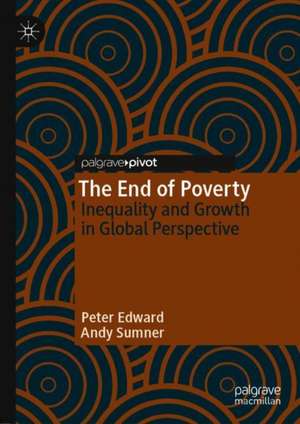The End of Poverty: Inequality and Growth in Global Perspective
Autor Peter Edward, Andy Sumneren Limba Engleză Hardback – 6 mai 2019
Preț: 415.39 lei
Nou
Puncte Express: 623
Preț estimativ în valută:
79.49€ • 86.32$ • 66.78£
79.49€ • 86.32$ • 66.78£
Carte tipărită la comandă
Livrare economică 22 aprilie-06 mai
Preluare comenzi: 021 569.72.76
Specificații
ISBN-13: 9783030147631
ISBN-10: 3030147630
Pagini: 59
Ilustrații: XII, 89 p. 15 illus., 7 illus. in color.
Dimensiuni: 148 x 210 mm
Greutate: 0.28 kg
Ediția:1st ed. 2019
Editura: Springer International Publishing
Colecția Palgrave Pivot
Locul publicării:Cham, Switzerland
ISBN-10: 3030147630
Pagini: 59
Ilustrații: XII, 89 p. 15 illus., 7 illus. in color.
Dimensiuni: 148 x 210 mm
Greutate: 0.28 kg
Ediția:1st ed. 2019
Editura: Springer International Publishing
Colecția Palgrave Pivot
Locul publicării:Cham, Switzerland
Cuprins
Chapter 1: Introduction.- Chapter 2: Growth and Distribution since the Cold War.- Chapter 3: A Model of Global Consumption, Output and Distribution.- Chapter 4: Global Poverty by Different Poverty Lines since the Cold War.- Chapter 5: The End of Global Poverty.- Chapter 6: Conclusion.
Notă biografică
Peter Edward is Director of the MBA programme and Lecturer in International Business Management at Newcastle University Business School, UK. His research focuses on business ethics and corporate social responsibility, the changing role of business in society and the impact of global economic growth on major societal challenges, particularly on poverty and inequality.
Andy Sumner is Reader in International Development at King’s College London, UK. His research focuses on global poverty and the distributional and welfare dynamics of late economic development in developing countries.
Andy Sumner is Reader in International Development at King’s College London, UK. His research focuses on global poverty and the distributional and welfare dynamics of late economic development in developing countries.
Textul de pe ultima copertă
In this book Edward and Sumner argue that to better understand the impact of global growth on poverty it is necessary to consider what happens across a wide range of poverty lines. Starting with the same datasets used to produce official estimates of global poverty, they create a model of global consumption that spans the entire world’s population. They go on to demonstrate how their model can be utilised to understand how different poverty lines imply very different visions of how the global economy needs to work in order for poverty to be eradicated.
Peter Edward is Director of the MBA programme and Lecturer in International Business Management at Newcastle University Business School, UK. His research focuses on business ethics and corporate social responsibility, the changing role of business in society and the impact of global economic growth on major societal challenges, particularly on poverty and inequality.
Andy Sumner is Reader in International Development at King’s College London, UK. His research focuses on global poverty and the distributional and welfare dynamics of late economic development in developing countries.
Peter Edward is Director of the MBA programme and Lecturer in International Business Management at Newcastle University Business School, UK. His research focuses on business ethics and corporate social responsibility, the changing role of business in society and the impact of global economic growth on major societal challenges, particularly on poverty and inequality.
Andy Sumner is Reader in International Development at King’s College London, UK. His research focuses on global poverty and the distributional and welfare dynamics of late economic development in developing countries.
Caracteristici
Develops a global perspective on the interaction of growth, poverty and inequality in order to bring greater clarity to the understanding of global poverty Argues counter-intuitively that it is not a lack of growth that is the cause of the persistence of global poverty It is the efficiency by which that consumption growth has been translated into poverty reduction which is of significance Draws attention to the way approaches to understanding data on poverty and inequality has a very significant impact on the narratives and policies that develop from the data
